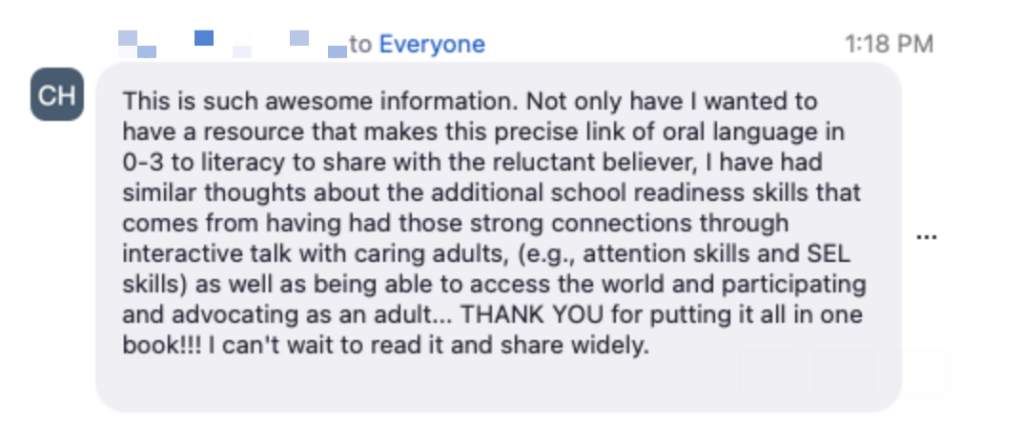In this webinar, Maya chatted with Araceli Diaz, Education Manager at Dallas nonprofit The Concilio, about kids’ path to literacy and how people who work with parents can support it.
In conversation with moderator Jen Rhodes from groundbreaking nonprofit LENA, Smart and Diaz discussed the crucial importance of interactive talk for early brain development. They also delved into ways that parents who don’t read confidently or don’t speak English can still use the power of their voices to raise strong readers.
Here are a few memorable quotes from the discussion:
As I learned more about reading achievement disparities among children from different communities—children who were black or Hispanic having lower reading achievement on average than white children, for example, or lower socioeconomic children having lower reading achievement than more well-off students—all of those things really didn’t sit well for me. And that’s when it emerged that this really is kind of a social justice and an equity issue, if we’re cutting off big populations of people from having the reading success they need. —Maya Smart
The most accurate predictors of a student’s achievement in school is not necessarily the income, the language or the socioeconomic status, but it’s the extent to which the student’s family is able to create that home environment that encourages learning, which includes the reading. That we’re able to communicate high yet reasonable expectations for our children’s achievement and their future careers, but also become involved in our child’s education, starting at home, the school, and the community. —Araceli Diaz
Just by having conversation, you’re building your child’s vocabulary, you’re teaching them words and what they mean, you’re teaching them about the world around them, and you’re giving them words that they’ll one day be able to recognize in print. —Maya Smart
The way that you talk to your children and have those conversations, it can be in your native language and you’re still building that conversation, you’re still building the number of vocabulary words that you’re exposing to them, the conversational turns that you have. So, to not be afraid, to know that as a parent, if you don’t speak natively the English language, but you do whatever your native language may be, it’s about the intentionality of how you converse with your child. It can be exposing your child to their native language through talk every single day or through books that are in your specific native language. —Araceli Diaz
Covid has really done a number on schools. We already had reading instruction challenges, in terms of teachers not being trained in how to help kids make some of those direct connections between letters and sounds, but then we also have teacher shortages and all kinds of systemic issues in school that make it hard for kids who enter behind to catch up. And so we’re seeing – On my book tour I heard from multiple second grade teachers who are now having kids entering their class with skill levels that you’d expect from a preschooler. So second grade teachers are having students who, because of doing kindergarten and first grade virtually, they didn’t learn letters, they didn’t learn how to hold a pencil or how to write their name. Things like that have implications for years. The more we can do to support parents and educate parents about the things they can do easily in everyday life, the better off everyone is. —Maya Smart
What Attendees Said

